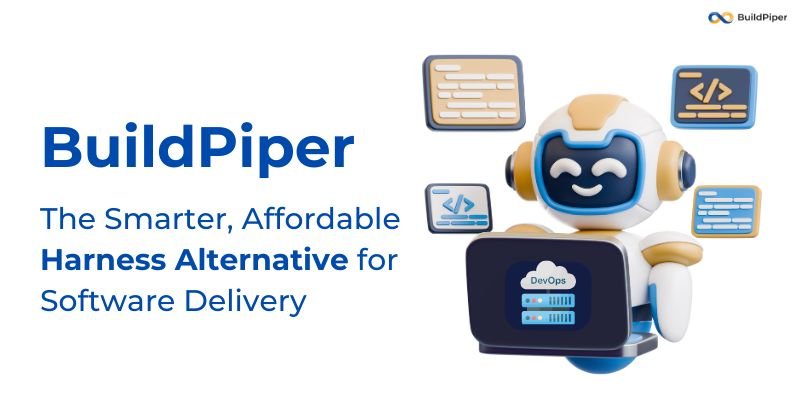DevOps has become a buzzword in the world of software development, with many organizations adopting it to improve the efficiency and quality of their software delivery processes. At its core, DevOps is all about collaboration between different teams involved in the software development lifecycle, including development, operations and quality assurance. However, to truly realize the benefits of DevOps, automation is essential. DevOps automation involves using various tools and techniques to automate the different tasks involved in the software delivery process, from building and testing to deployment and monitoring.
Here, in this blog, we’ll explore what DevOps automation is, why it’s important, and how it can benefit your organization. We’ll cover a list of DevOps processes that should be automated and some real use cases where DevOps automation can be applied. So, let’s dive in and explore the world of DevOps automation!
What is DevOps Automation?
DevOps Automation refers to the process of automating the software development, testing and deployment processes in the DevOps lifecycle. This involves using various tools and technologies to automate repetitive tasks, streamline workflows and improve the overall efficiency and speed of the software delivery pipeline.
DevOps Automation involves automating tasks such as code compilation, testing, packaging and deployment. This can be achieved using tools like Jenkins, Ansible, Puppet, Chef and many others. Automation helps to reduce errors and inconsistencies that can occur during manual tasks and it allows teams to focus on higher-level tasks that require human intervention.
DevOps Automation also includes automating the monitoring and management of software applications in production. This helps to ensure that the applications are running smoothly and any issues are detected and resolved quickly. It involves using tools like Nagios, Prometheus, Grafana and many others. DevOps Automation is an essential component of software development, as it helps to increase speed, efficiency and reliability while reducing the risk of errors and downtime.
Benefits of DevOps Automation
There are numerous benefits to implementing DevOps Automation in software development. Some of these benefits include:
- Increased Speed: Automation enables faster and more efficient software development and deployment processes, reducing the time it takes to deliver new features and updates.
- Improved Quality: By automating testing, software deployment, and monitoring processes, teams can reduce errors and inconsistencies, resulting in higher-quality software that is more reliable and stable.
- Enhanced Collaboration: Automation encourages closer collaboration between development and operations teams, enabling better communication and coordination.
- Greater Efficiency: Automation eliminates manual, repetitive tasks, allowing teams to focus on higher-level tasks that require human intervention.
- Cost Savings: Automation reduces the need for manual labour and minimizes downtime, resulting in significant cost savings over time.
- Faster Time-to-Market: With faster development and deployment processes, teams can bring new features and products to market more quickly. This helps businesses to gain a competitive edge in their industry.
- Improved Customer Satisfaction: High-quality software delivered more quickly and reliably leads to higher customer satisfaction.
DevOps Automation provides significant benefits for software development and operations, including increased speed, improved quality, enhanced collaboration, greater efficiency, cost savings, faster time-to-market and improved customer satisfaction.
[Good Read: Revolutionizing DevOps Transformation with BuildPiper]
Real Use Cases of DevOps Automation
DevOps Automation has numerous use cases across software development. DevOps processes that are well-suited for automation include those that are repetitive, time-consuming, error-prone and require consistent execution. DevOps Automation is used for automating Continuous Integration/Continuous Deployment (CI/CD) Pipeline processes. Here are some examples of how DevOps Automation can be applied in different scenarios:
- Continuous Integration/Continuous Deployment (CI/CD) Pipeline: DevOps Automation can be used to implement CI/CD pipeline, enabling teams to automate the building, testing and deployment of code changes. This allows teams to deliver new features and updates to customers quickly and reliably.
- Infrastructure as Code (IaC): DevOps Automation can be used to automate the deployment and management of infrastructure using IaC tools like Terraform, CloudFormation and Azure Resource Manager. This allows teams to manage infrastructure as code, reduce errors and improve consistency.
- Automated Testing: DevOps Automation can be used to automate various types of testing, including unit testing, integration testing and performance testing. This ensures that code changes are thoroughly tested and meet the required quality standards.
- Deployment Automation: DevOps Automation can be used to automate the deployment of code changes to various environments, including development, testing, staging and production environments. This reduces the risk of errors and downtime during the software deployment process.
- Monitoring and Alerting: DevOps Automation can be used to automate the monitoring and alerting of application performance and infrastructure health. This ensures that issues are detected and resolved quickly, reducing the impact on customers.
- Security Automation: DevOps Automation can be used to automate various security processes, such as vulnerability scanning and security testing. This ensures that code changes meet the required security standards, reducing the risk of security breaches.
DevOps Automation has numerous use cases across software development and operations, allowing teams to automate repetitive tasks, reduce errors and improve efficiency and reliability. Also, automating DevOps processes and implementing DevOps with CI/CD security helps to ensure a safe and hassle-free software delivery.
The Big Picture
DevOps automation is a crucial aspect of the DevOps philosophy that helps organizations deliver high-quality software faster and more efficiently. By automating manual and repetitive tasks, teams can focus on more strategic activities that require human expertise, while also reducing errors and increasing consistency. DevOps automation is not just about using the right tools and technologies, but also about adopting a culture of collaboration, continuous improvement and experimentation.
Organizations that successfully implement DevOps automation can achieve a competitive advantage by delivering software that meets the needs of their customers faster and more reliably. Hope, this blog has provided you with a better understanding of what DevOps automation is, why it’s important and how you can implement it in your organization. Remember, DevOps automation is not a one-time activity, but an ongoing journey of continuous improvement, so you need to keep experimenting to achieve the best results.
Looking to improve your software delivery process and increase your agility? Look no further than our DevOps automation services! Our team of experts can help you implement a DevOps automation strategy tailored to your unique needs and goals. With continuous integration and JIRA Integration with CI/CD Pipeline, you can catch and fix issues earlier in the delivery process, reducing the risk of defects and downtime. We help your business to automate DevOps processes and implement DevOps with CI/CD security to ensure a safe and hassle-free software delivery.
Here’s how we empowered one of the leading AI robot companies with the right compliance and faster deployments in their DevSecOps.Take a look!
So, don’t let manual and repetitive tasks slow you down – let BuildPiper’s features help you accelerate your software delivery and increase your agility. Schedule a DEMO NOW!









